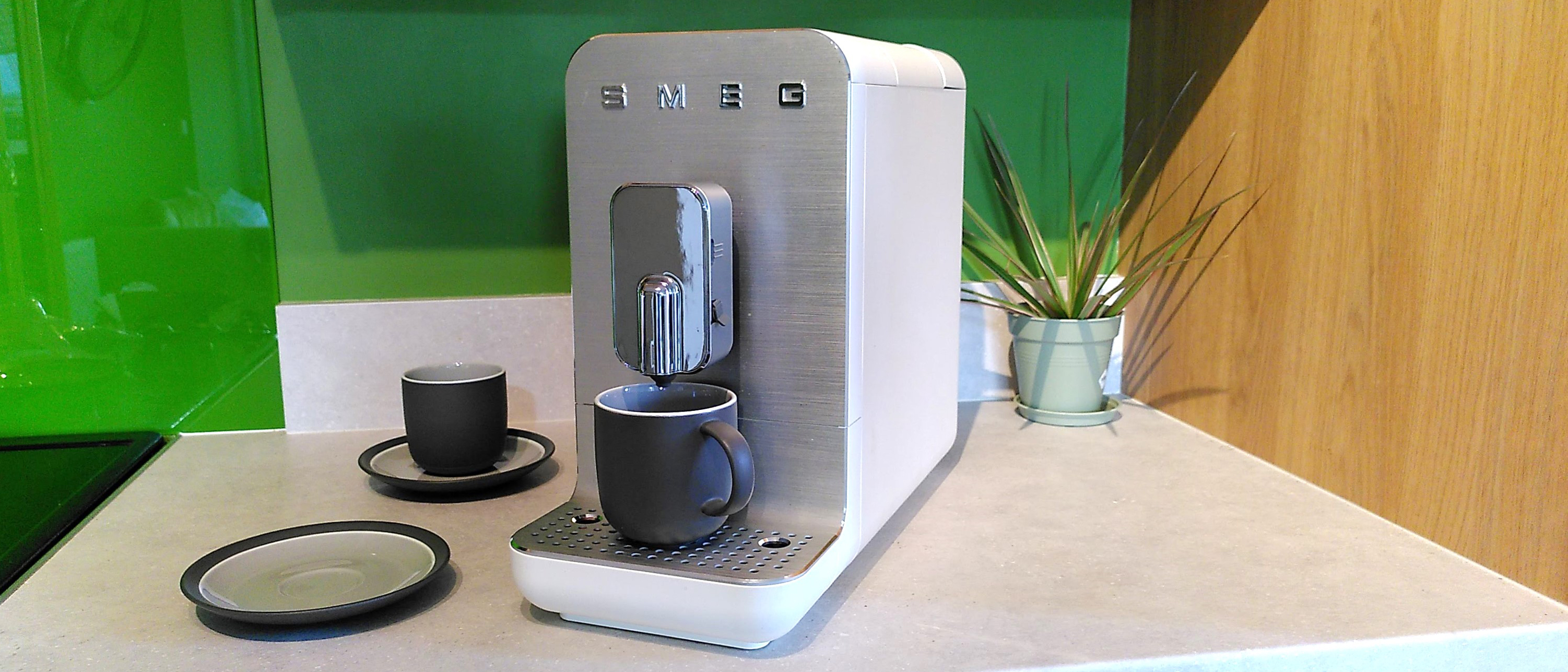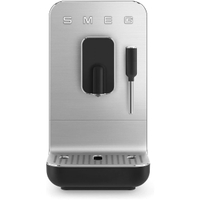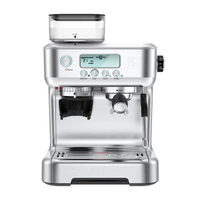TechRadar Verdict
The BCC13 delivers perfectly brewed coffee and sweet, creamy foamed milk consistently, with a minimum of effort. It's a thoughtfully designed bean-to-cup machine that makes brewing and cleanup as straightforward as possible - and looks stunning on your kitchen counter, too. It's certainly not cheap, but if your budget can take the hit then it's hard to think of a better option.
Pros
- +
Consistently well-extracted coffee
- +
Thick, creamy froth for cappuccinos and lattes
- +
Well made, durable build quality
- +
Easy to keep clean
Cons
- -
Frother doesn't work well with non-dairy milk
- -
Coffee option buttons aren't self-explanatory
Why you can trust TechRadar
Smeg BCC13: one-minute review
The Smeg BCC13 is a fully automatic bean-to-cup espresso machine with an automatic milk frother, which produces consistently well extracted coffee time after time.
The BCC13 is built to a very high standard, with thoughtful touches like an easy to access dump bucket for grounds; refill, cleaning, and descaling alerts; and smooth interior surfaces that are a piece of cake to keep clean. The machine warns you whenever refilling or cleaning is necessary, and a quick clean cycle of its milk and dispenser system takes just one minute from start to finish.
It has presets for nine different drinks, plus hot water for making tea, and you can tailor the length of lattes, cappuccinos, and americanos to suit the size of your cups. The most popular drinks are available with a single tap of the buttons on top of the machine, and less common options can be accessed by holding a button to access a secondary menu. It's not always immediately obvious which button relates to which drink, so you may find yourself relying on the quick start guide for the first week or so, but you'll soon get the hang of it.
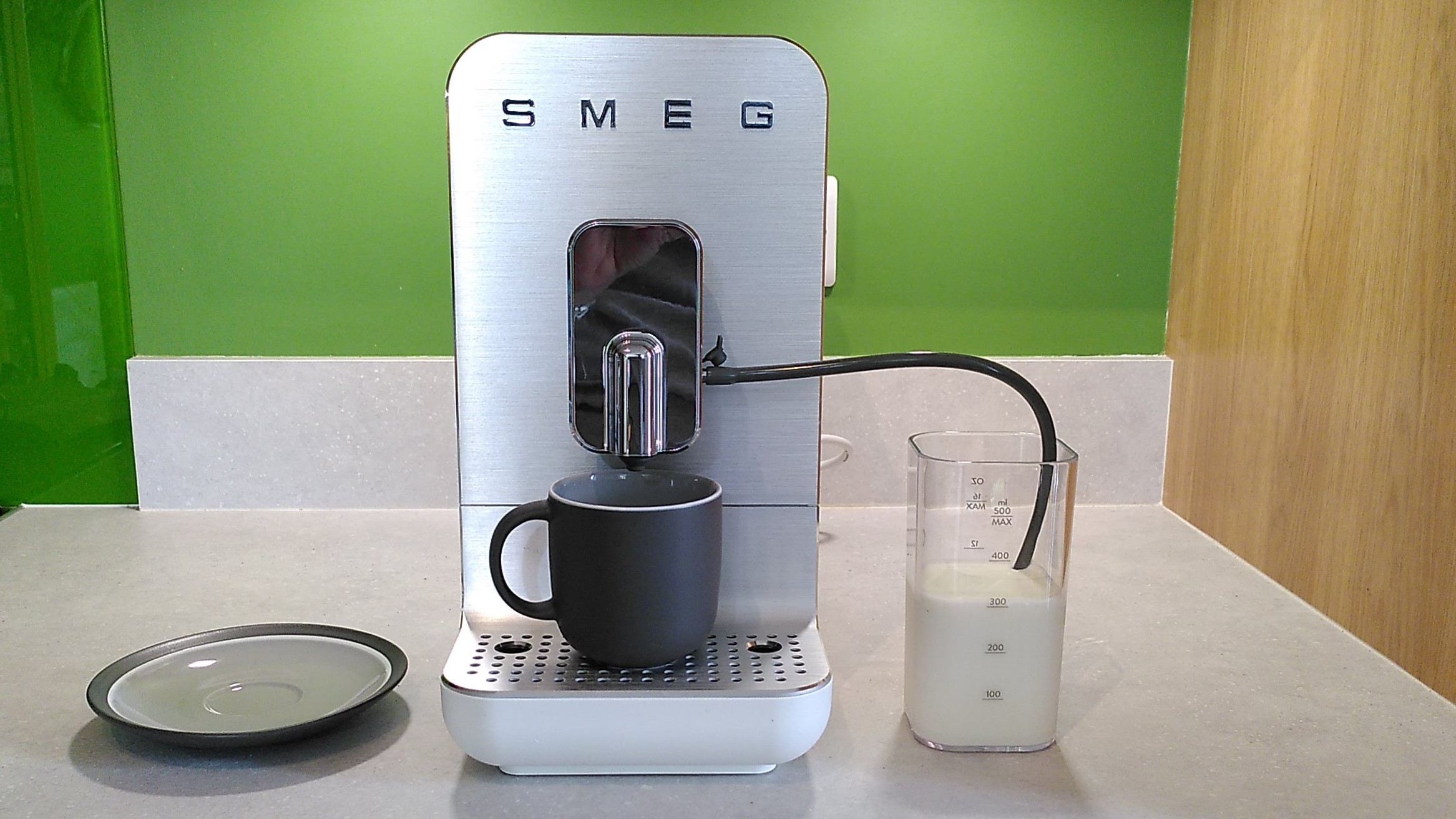
This is the first coffee maker in the BCC series with an automatic milk frother, and it works extremely well. Just pour your milk into the robust container (which has an airtight lid so you can store it in the fridge), immerse one end of the rubber tube, and gently push it into place on the side of the dispenser. The BCC13 produces thick, creamy foam for cappuccinos and lattes, and the milk is heated enough to break down the lactose for a delicious, sweet foam without ever being scalded.
It doesn't work well with plant-based milks (even barista ones), but that's typical for a coffee maker with an automatic frother and Smeg does warn you that results won't be the same as they are with dairy. If you enjoy oat or soya in your lattes and cappuccinos, you might prefer to opt for one of Smeg's coffee makers with a manual steam wand, which give you total control. Our guide to the best espresso machines includes lots more options to check out.
Smeg BCC13: price and availability
- List price: $1,200 / £799.95 / AU$1,199
- Launch date: July 2024
- Availability: global
The Smeg BCC13 launched in July 2024, as a successor to the Bean to Cup BCC02. It has a list price of $1,200 / £799.95 / AU$1,199, and although it was only available in the UK initially, it can now be bought worldwide.
That's more than the BCC02, which retailed at around $1,000 / £680 / AU$970 depending on the retailer, but the price increase isn't huge considering the BCC13 has been upgraded with a fully automatic milk frother.
Bean-to-cup machines always carry a premium price tag, but the BCC13 certainly isn't the most expensive coffee maker of its type. The De'Longhi Dinamica Plus is an excellent machine, but at $1499.95 / £1199.99/ AU$1529 , it's beyond the budget of all but the most serious espresso lovers.
If you're on a tighter budget, I recommend considering a manual espresso machine like the Breville Bambino Plus, which retails at $499.95 / £399.95 / AU$649. There's more of a learning curve and you'll need a separate coffee grinder, but it's half the price and earned four and a half stars from our reviewer.
- Value score: 4.5/5
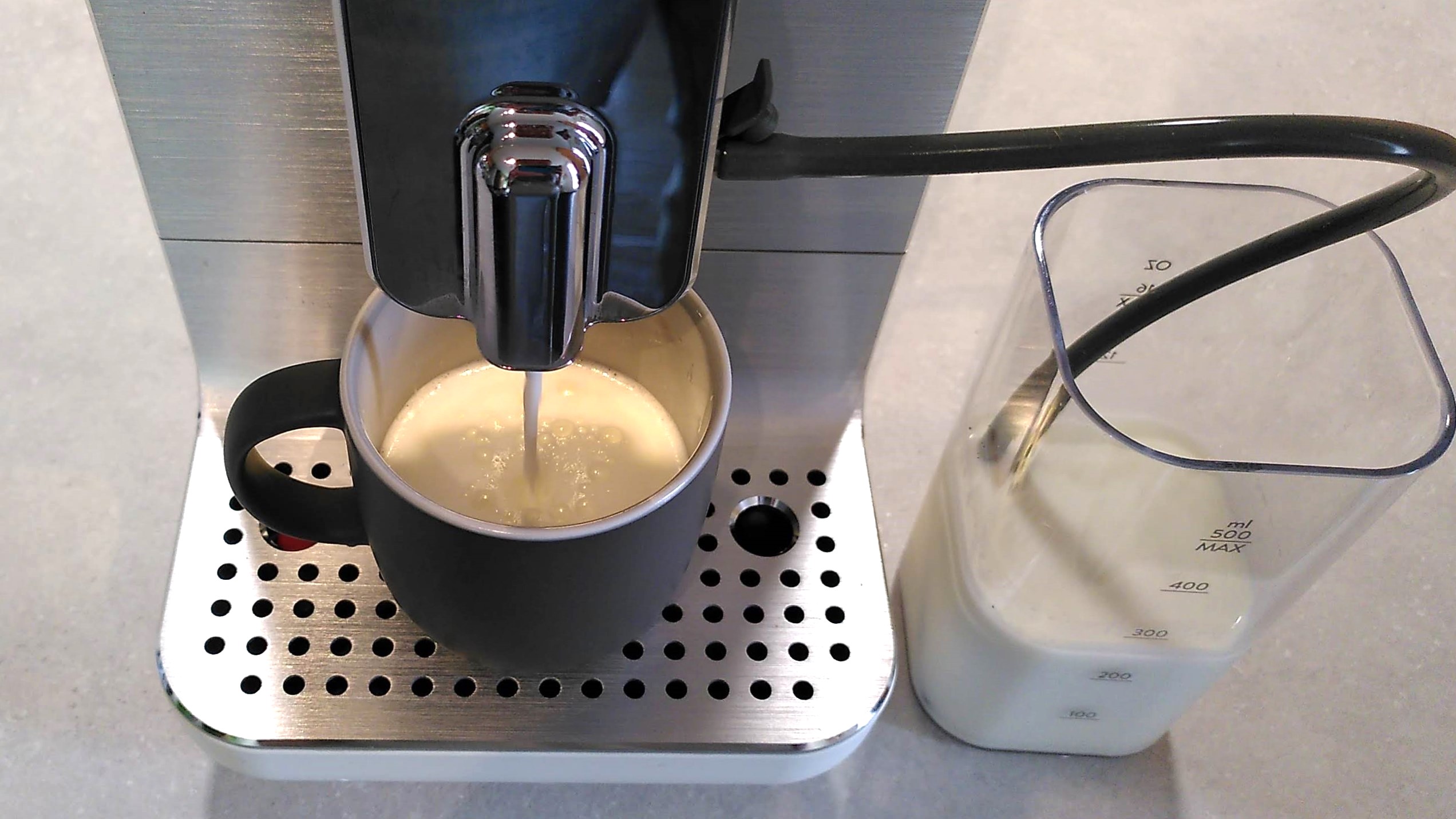
Smeg BCC13: specs
| Name | Smeg BCC13 |
| Type | Fully automatic bean-to-cup espresso machine |
| Dimensions (H x W x D) | 13.2 x 7 x 17in / 336 x 180 x 433mm |
| Weight | 20lb / 9kg |
| Water reservoir capacity | 47.34oz / 1.4L |
| Milk frother | Yes |
| Number of drink options | 9 (plus hot water) |
| Bars of pressure | 19 |
| Noise level | 67dB |
| Cord length | 39 3/8in / 1m |
Smeg BCC13: design
- Sleek, modern look
- Thoughtful touches for easy cleaning
- Drink option buttons need a reference guide
The Smeg BCC13 looks almost identical to the BCC02, but instead of a steam wand permanently attached to the front, it has a removeable rubber hose for its automatic milk steaming system. It's a stylish machine, with a smooth black, white, or emerald green case and a brushed aluminum front.
The dispenser on the front slides up and down with a smooth motion to accommodate different cup sizes, and has a port in the side for the milk hose. You can remove the milk pumping system by opening the front of the dispenser and pulling the unit out for cleaning.
Coffee beans are loaded into a hopper on the top (the BCC13 will warn you when it's empty) and there's a large water reservoir at the back, with a carry handle so you can easily take it to the tap or use a filter jug to refill it. The reservoir has a generous maximum capacity of 47.34oz / 1.4L, so it doesn't need refilling often, and the machine will automatically purge the water line when the reservoir is re-inserted,
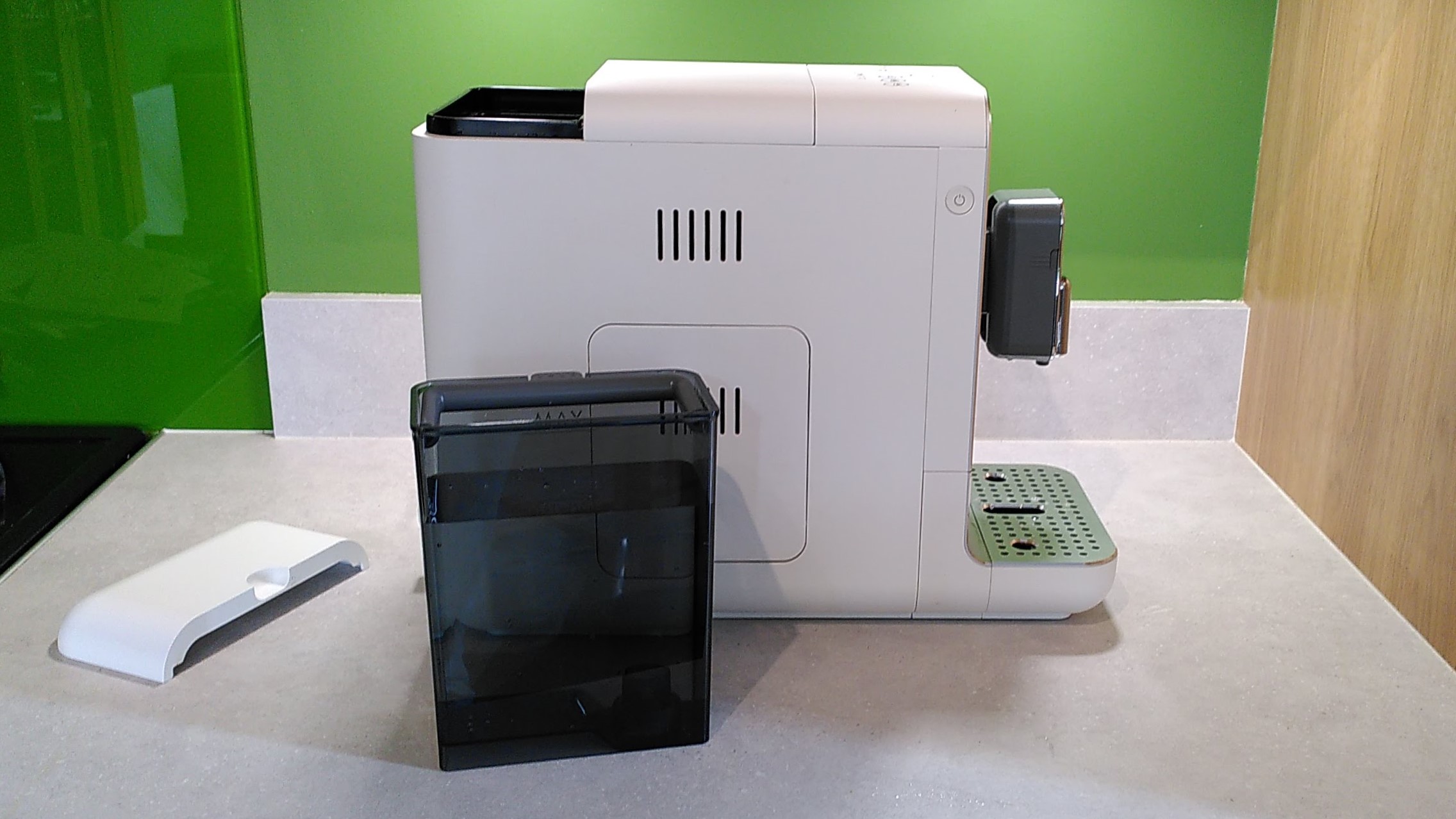
A side door in the machine allows you to access the machine's brew group, which will sometimes need cleaning to remove buildup of coffee grounds. Just press the buttons on the side of the group unit, then gently pull to remove it. Once it's out, you can simply rinse it under a tap to get rid of buildup, then give it a dry with a tea towel before replacing it.
You'll receive a warning from the machine when the brew group needs cleaning, and a light will illuminate on top if you've accidentally left the panel off.
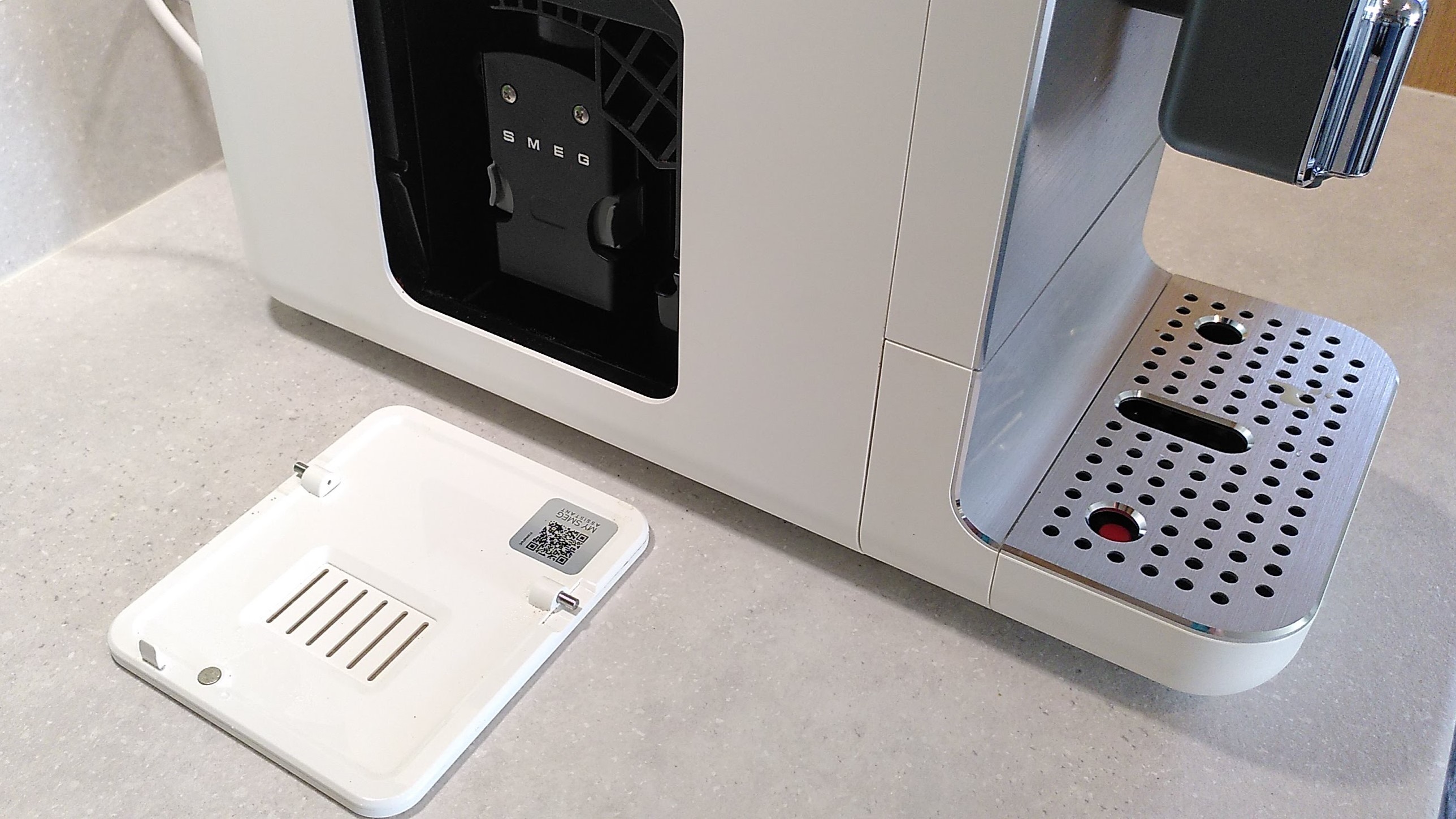
The drip tray slots onto the front of the machine, and you'll receive a warning when it's starting to get full. It has a generous capacity so it doesn't need emptying too often, despite the machine's automatic purging function, and like all parts of the BCC12, it feels robust and durable.
Used grounds are dropped into a convenient waste caddy at the bottom of the machine, which you'll find by removing the drip tray and sliding out a drawer. The caddy holds up to seven pucks of used espresso, and again, the BCC13 will warn you when it needs emptying. The caddy simply lifts out, and you can wash it using dish soap and water.
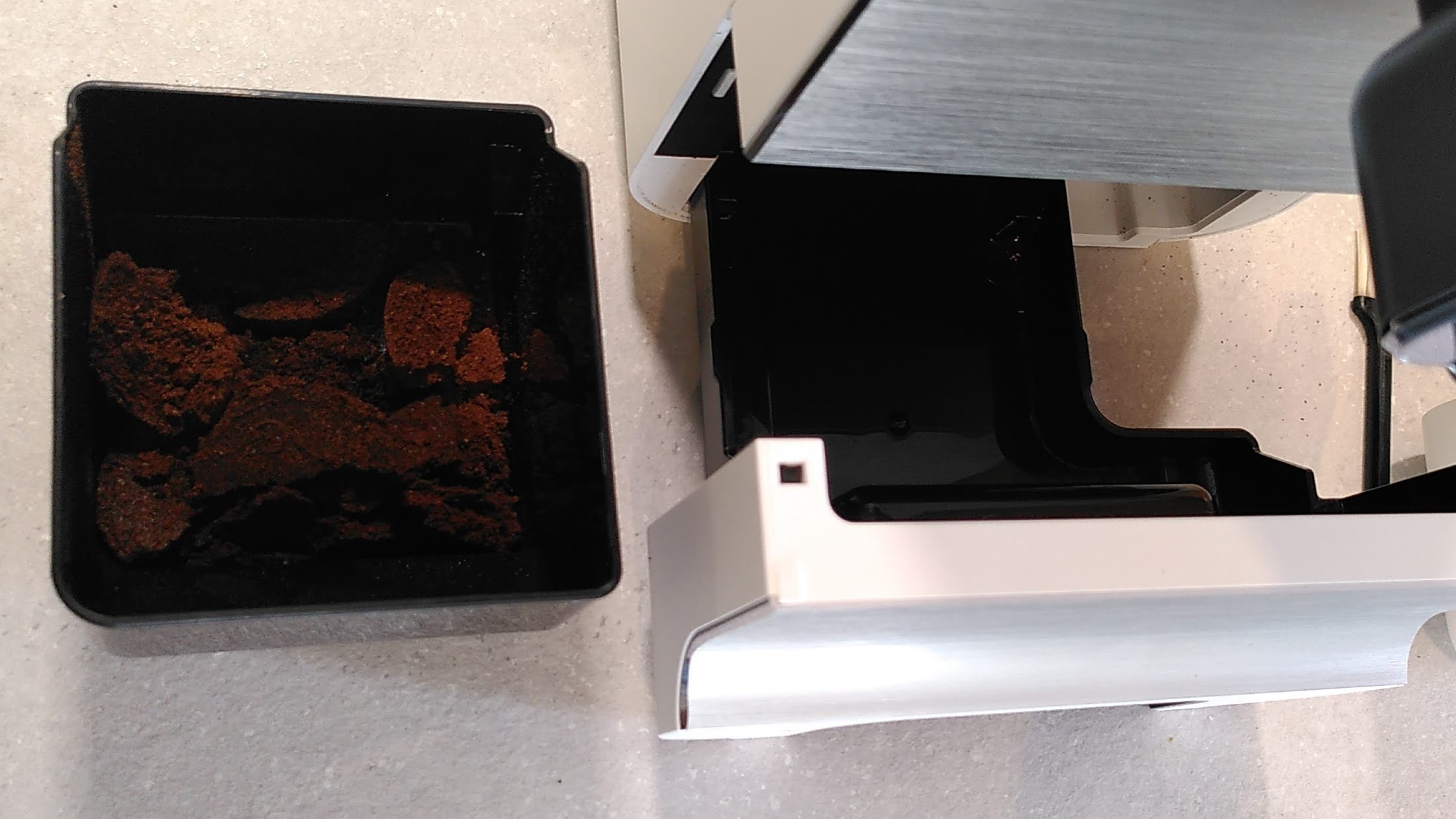
A set of five buttons on the top of the machine let you choose the type of drink you'd like to make. When they are illuminated white, you can pick from espresso, coffee, hot water for tea, cappuccino, and latte macchiato. Pressing the slightly larger button underneath them will switch the lights to orange, and let you choose
espresso light (a less extracted shot), long coffee, americano, espresso macchiato, or foamed milk.
It's obvious what some of the buttons will do from the icons alone, but until you've used the machine for a few days, you'll probably need to consult the quick start guides included in the packaging to remind you what each ones does.
The final button, on the right, starts the machine's quick clean cycle. It will flash after you use the BCC13's milk frothing system, prompting you to fill the cleaning container with water, insert the end of the hose, and press the button for three seconds to purge the system. Dirty water will be flushed out, leaving the machine ready to use again next time.
You can carry on making drinks without performing the cycle, but I timed it, and the process only takes one minute from start to finish.
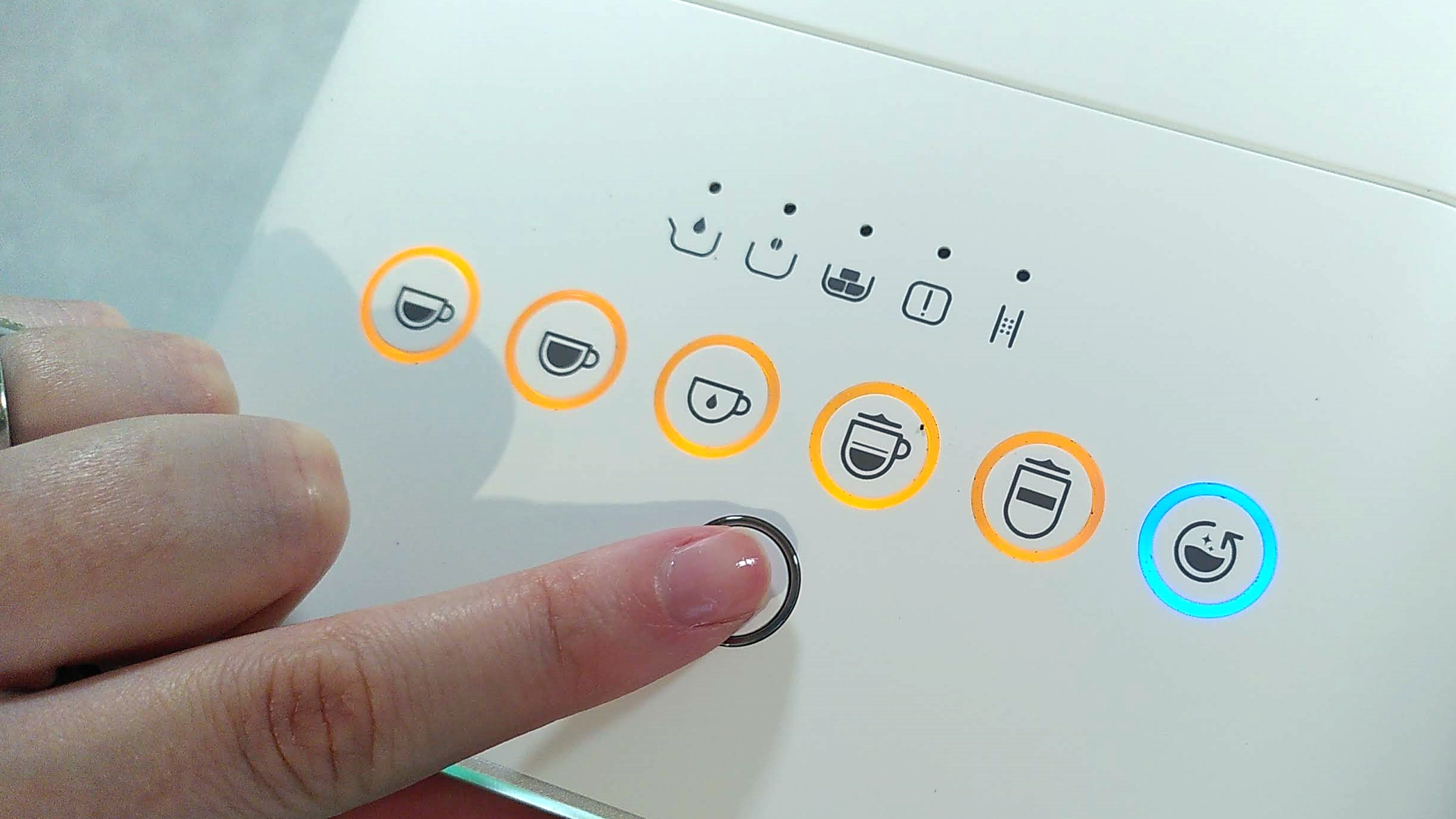
The machine is supplied with a sturdy milk container with a maximum capacity of 500ml / 16oz, which has a rubberized lid so you can store it hygienically in the fridge when it's not in use. It's easy to clean by hand with dish soap and warm water.
- Design score: 5/5
Smeg BCC13: performance
The appeal of a premium bean-to-cup coffee maker is consistency, and the Smeg BCC13 excels, creating perfect shots of espresso with thick, rich crema every time. You can tinker with the grind size if you like, but I found the default settings produced a well extracted espresso with no adjustment. The entire process of brewing an espresso took 1:04 minutes from pressing the button to completion, and the BCC13 reached a maximum volume of 67dB (though most of the brewing process was much quieter).
I carried out our regular test of an espresso by placing a teaspoonful of demerara sugar on top. It sat for a few seconds before sinking through the crema, which is a sign of a good shot.
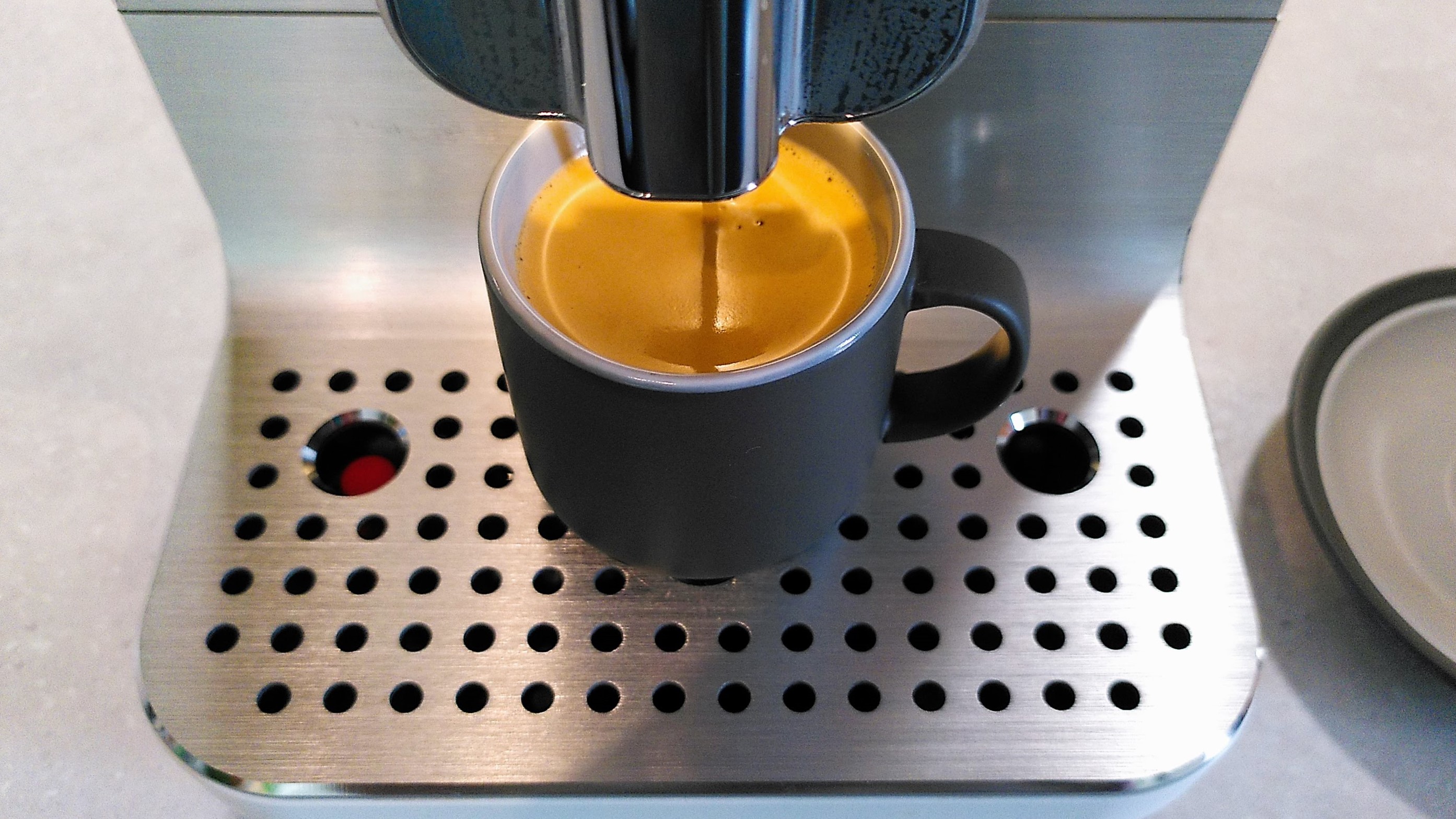
The inclusion of a hot water setting is a welcome addition that we don't see with all fully automatic espresso machines, and means you don't need a kettle for brewing tea. The foamed milk feature is also thoughtful, providing a babyccino on demand (just dust on some cocoa when it's done).
The built-in milk frother is very consistent, producing thick and creamy foam for cappuccinos and lattes. Milk was never overheated either; the BCC13 warms it enough to break down the lactose for a sweet taste, without scalding it. As with the well extracted coffee, the results are the same time after time, with no manual alterations necessary.
Depending on the size of your cups, you may want to adjust the volume of lattes, cappuccinos, and americanos by changing the amount of milk or water dispensed. You can do this by holding down one of the drink selection buttons until you hear a tone, then pressing the button again once the machine has dispensed the right amount. The BCC13 will save this preset for future use.
If you want to stop dispensing the current drink early, you can do so by tapping the drink selection key. This won't affect the presets.

The only real downside is that the Smeg BCC13 can't handle plant milks particularly well. Smeg's documentation advises that although you can steam non-dairy alternatives using its machines, you'll get better results with cow milk, and that certainly proved to be the case. A cappuccino made using barista oat milk had barely any foam on top (as shown in the picture below), and the machine overheated the milk rather than incorporating air. Smeg does warn you about this, and it's standard for a machine with an auto milk frother, so the BCC13 doesn't lose marks for it.
If you want to use oat, soy, almond, or coconut milk to make drinks then you may be better served by the Smeg BCC02, which has a manual steam wand so you can adjust the pressure and use your own technique to get the right texture. Alternatively, you could opt for the BCC01 espresso machine, which has no steam feature at all, and pick up a standalone milk frother like the Dreo BaristaMaker, which has presets for plant milks.
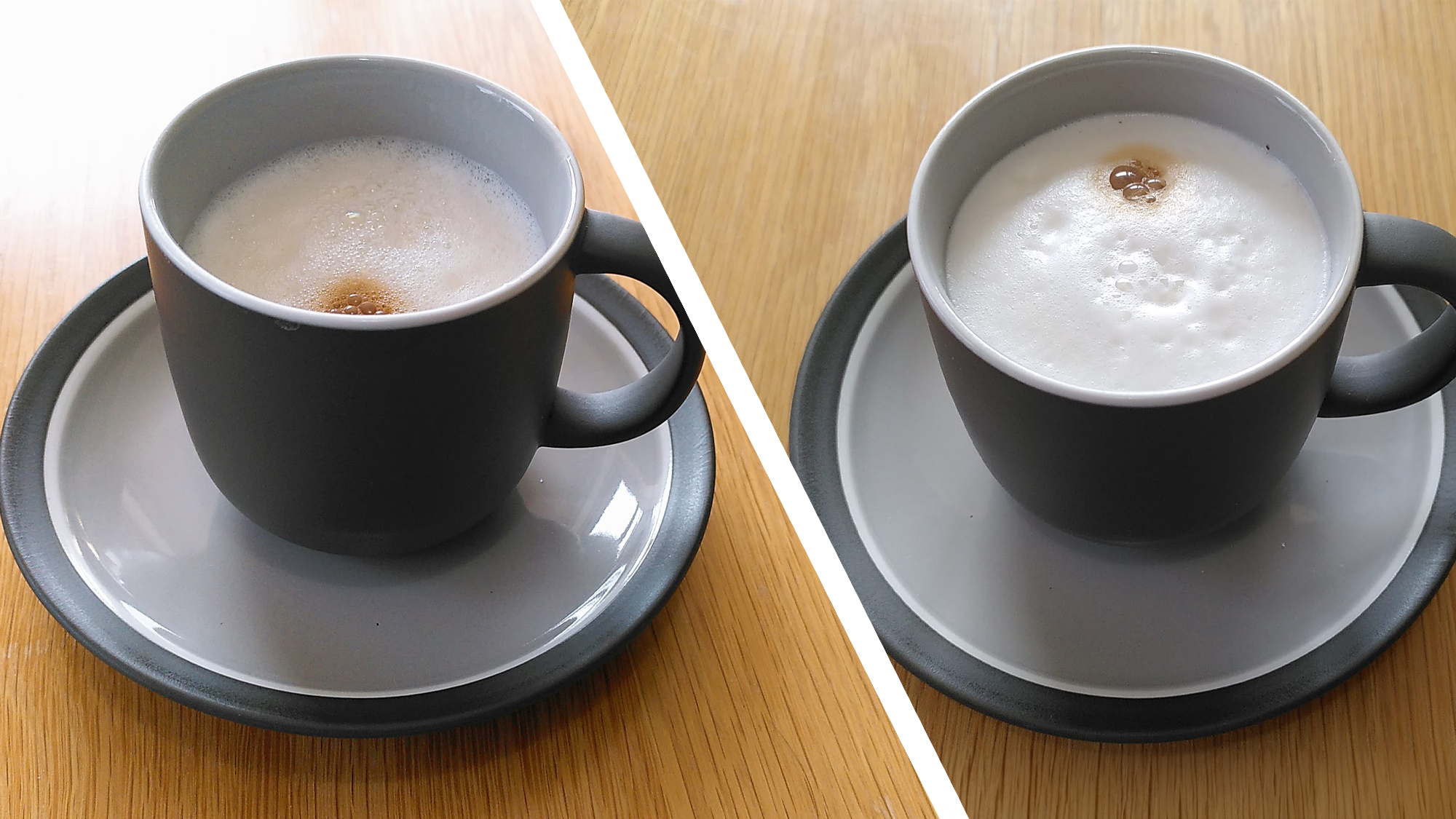
Fully automatic coffee makers are wonderfully convenient when you just want to make a drink with the minimum of fuss, but the moving parts mean they tend to be more of a hassle to clean than a manual machine. Thankfully the BCC13 keeps that to a minimum by prompting you to carry out regular cleanup tasks so things never get too messy.
You will be promoted to purge the dispenser and tubing each time you use the milk frother, which is sensible and prevents buildup of bacteria. When the quick clean button flashes, fill the square cleaning container with plain water, place it under the dispenser, and insert the end of the milk tube. Hold the button for three seconds and the machine will flush its whole dispensing system with hot water and steam, and pump the resulting waste into a reservoir in the cleaning container. It's impressive just how much it cleans out each time.
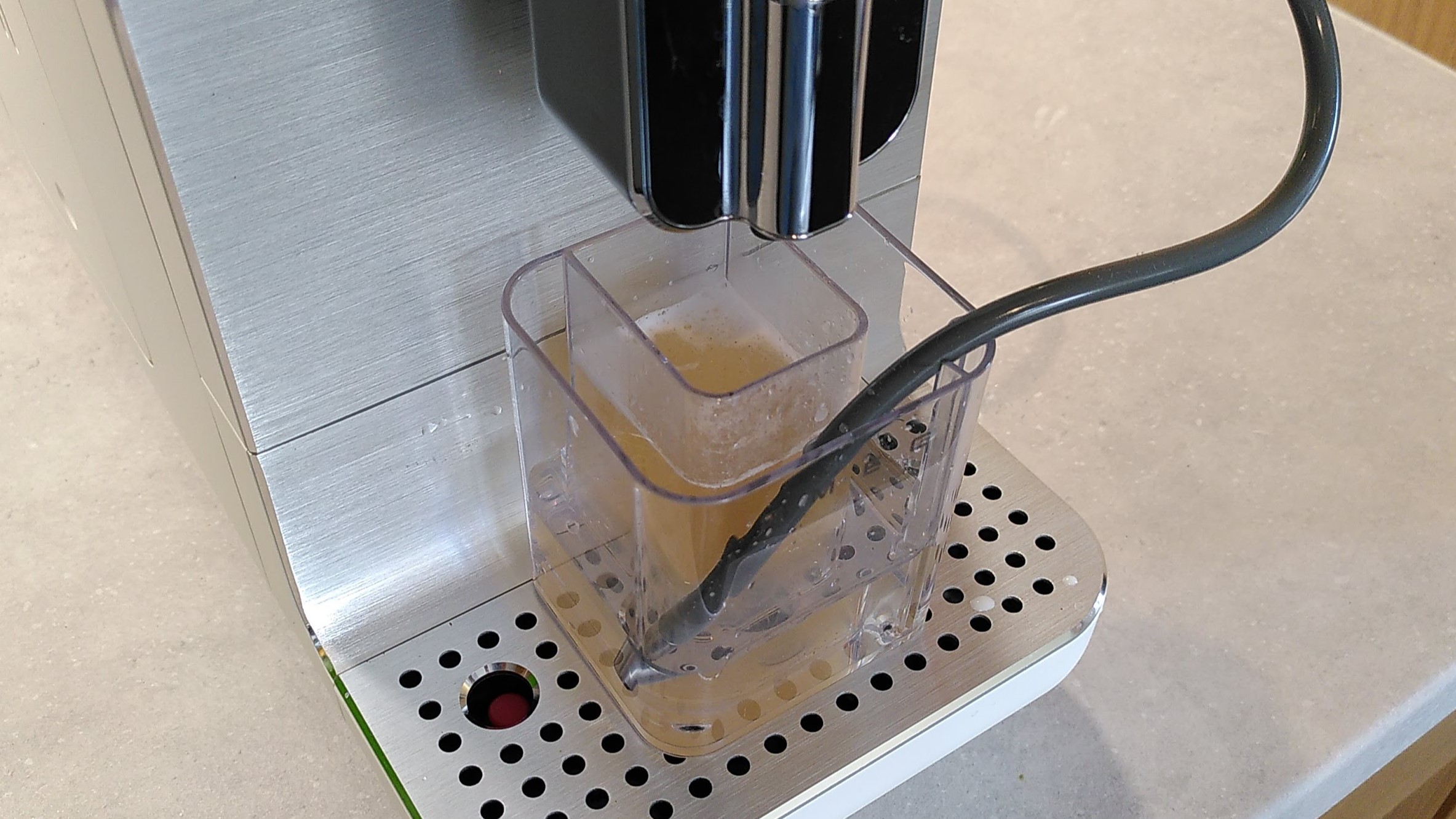
A few stray coffee grounds inevitably end up falling inside the machine as it works, but not too many, and they're easy to clean up. The bottom of the BCC13 is easy to access with the drawer pulled out, and its smooth interior surface means you can use a brush or a piece of kitchen towel to wipe it out in a few seconds. The whole machine is made and finished to a very high standard, and there's nowhere for stray grounds to get trapped.
- Performance score: 5/5
Should you buy the Smeg BCC13?
| Attribute | Notes | Score |
|---|---|---|
| Value for money | Not cheap, but within the normal range for a fully automatic bean-to-cup machine. If you need something cheaper, a manual machine may suit you better. | 4.5/5 |
| Design | Extremely high build quality, and easy to use and keep clean on an everyday basis. | 5/5 |
| Performance | Produces consistent results every time, with good quality coffee and well foamed dairy milk. | 5/5 |
Buy it if
You value ease of use
The Smeg BCC13 is fully automated, and is the easiest way to enjoy freshly ground and brewed coffee from bean to cup. It will deliver consistently good results time after time, with little to no tinkering required on your part (just a little cleaning when prompted).
You make several coffees daily
The BCC13 is a big investment, so you'll need to be frequent coffee drinker to justify the expense. Making a drink can take as little as one minute from start to finish, so it could be a real time-saver if you usually brew up several times during the day.
Don't buy it if
Coffee-making is your hobby
This is a fully automated machine, so there's not too much space for taking things into your own hands. Smeg also produces some great manual espresso makers (like the stylish EMC series, which you should check out if you like the look of the BCC13 but enjoy the full home barista experience.
You enjoy plant-based milk
As Smeg says, the BCC13 works best with dairy milk, and doesn't handle plant-based alternatives nearly as well. If almond, soy, oat, or coconut is more your thing, you could opt for an espresso machine with a manual steam wand that gives you full control, or skip the steamer altogether and opt for a standalone frother like the Dreo BaristaMaker, which has presets for plant milks.
Smeg BCC13: also consider
| Header Cell - Column 0 | Smeg BCC13 | Smeg BCC02 | Casabrews 5700Pro |
|---|---|---|---|
| Price | $1,200 / £799.95 / AU$1,199 | $1,000 / £680 / AU$970 | $899.99 (about £700 / AU$1,300) |
| Type | Automatic bean-to-cup | Automatic bean-to-cup | Semi-automatic bean-to-cup |
| Milk frother | Automatic | Manual wand | Manual wand |
| Bars of pressure | 19 | 19 | 20 |
If you're not sure about the Smeg BCC13, here are a couple of other options to think about:
Smeg BCC02
If you like the sound of the BCC13 but you enjoy plant-based milk, the slightly older BCC02 would be a great option. It has a steam wand rather than an automated frother, putting you in control of the heat and air integration - and it costs a little less as well.
Read our full Smeg BCC02 review
Casabrews 5700Pro
This machine has its own grinder, and will help with weighing and dosing, but you get more of the barista experience by putting you in control of adjusting the grind size, tamping the grounds, and pulling the shot. The biggest downside is that it's only available in the US at the time of writing.
Read our full Casabrews 5700Pro review
How I tested the Smeg BCC13
I had the Smeg BCC13 on loan for two weeks, during which time I used it to make all sorts of drinks using high quality medium roasted Brazilian espresso beans, and compared them to the same drinks made using a manual Gaggia Classic machine.
I tested the BCC13's automatic milk frother using both chilled whole dairy milk and barista-style oat milk, and compared the results with those created by foaming milk with a manual steam wand.
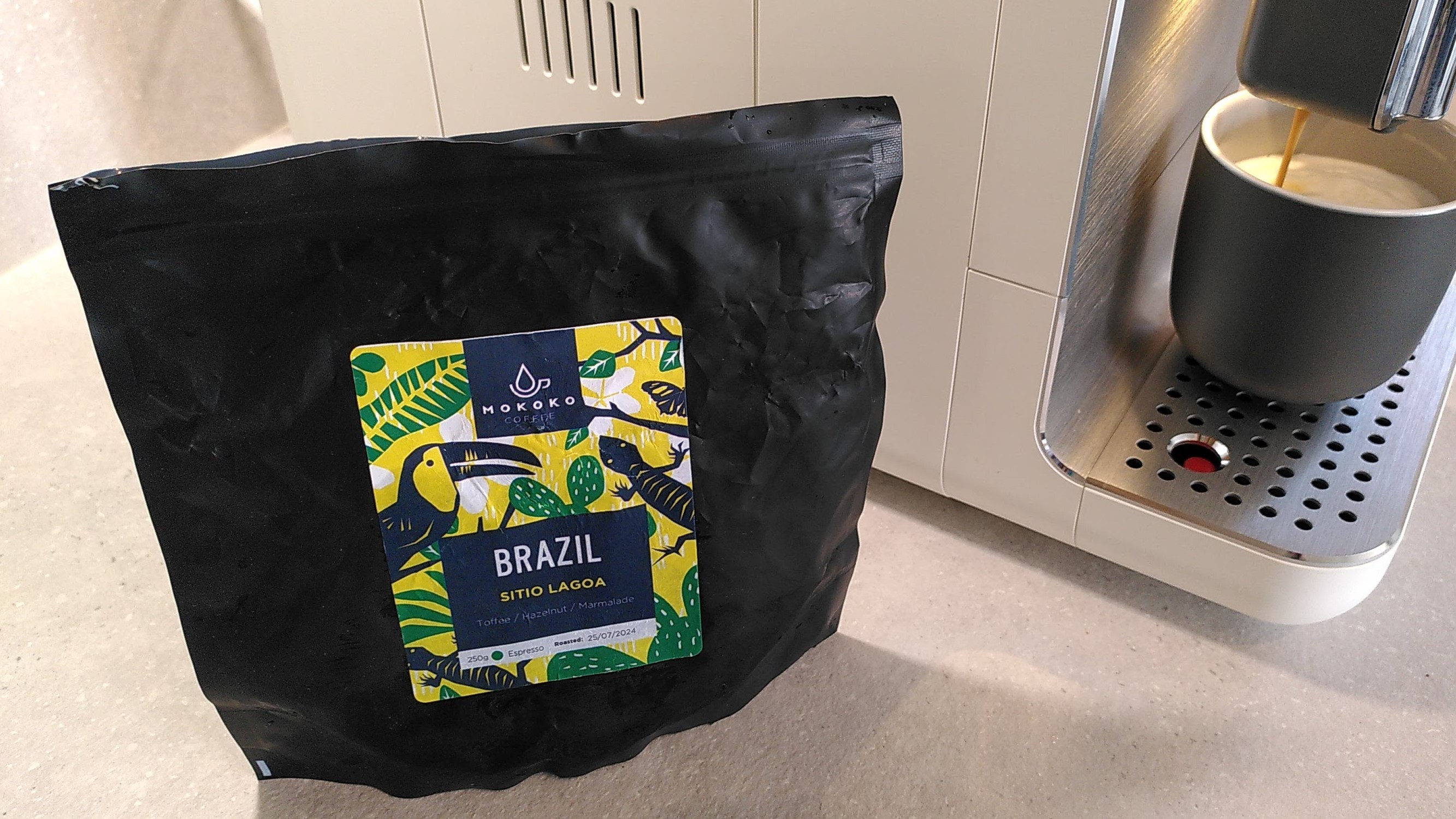
I measured the volume of the machine throughout the brewing process using a decibel meter app on my phone, and used my phone's timer to see how long it took to brew a drink and complete a quick cleaning cycle.
Read more about how we test.
First reviewed August 2024

Cat is TechRadar's Homes Editor specializing in kitchen appliances and smart home technology. She's been a tech journalist for 15 years, having worked on print magazines including PC Plus and PC Format, and is a Speciality Coffee Association (SCA) certified barista. Whether you want to invest in some smart lights or pick up a new espresso machine, she's the right person to help.
